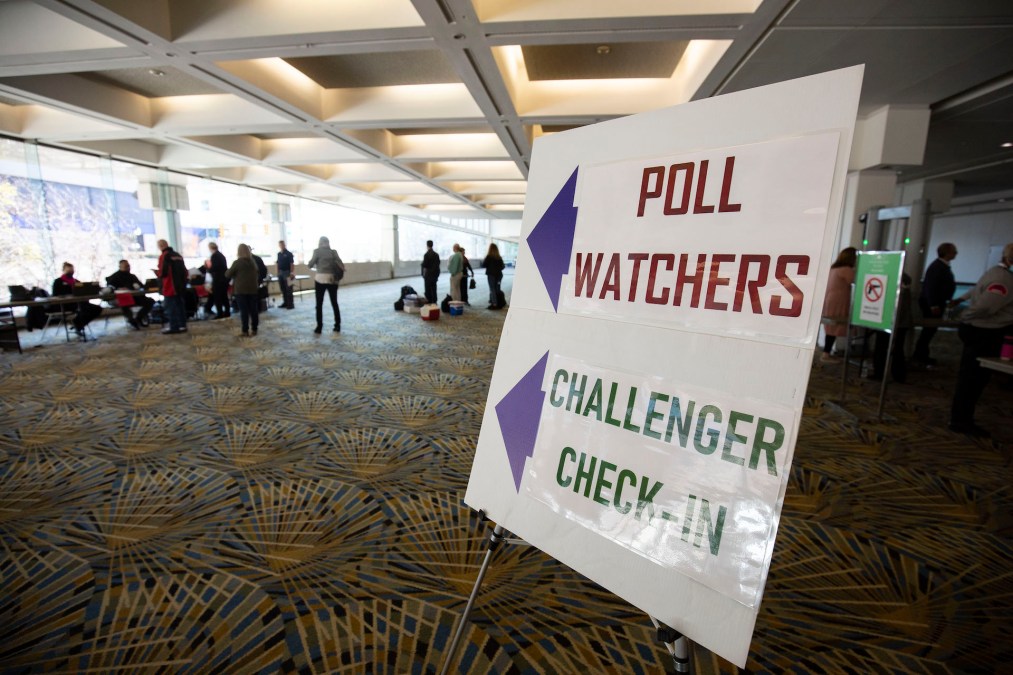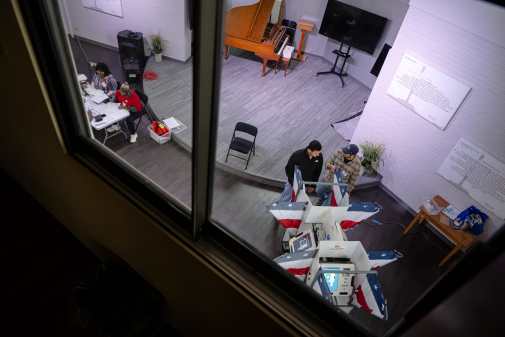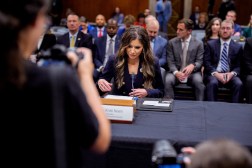The disinformation threat facing US midterms extends beyond Election Day

Disinformation continues spreading online ahead of Tuesday’s midterms — casting doubt on everything from the vote-counting process to the trustworthiness of ballot drop boxes — threatening to further destroy confidence in the democratic process.
But the biggest threat from these falsehoods and lies may come after voting ends and as officials begin announcing winners in contentious and tight elections around the country.
“I certainly would not expect the disinformation to end on Election Day,” said Suzanne Spaulding, a former undersecretary at the Department of Homeland Security who now directs the Defending Democratic Institutions project at the Center for Strategic and International Studies. “I think in fact, that it will grow, particularly in a context in which it appears as though, for example, somebody who’s an election denier is losing.”
Researchers and national security officials warn that how these narratives play out and whether they gain widespread acceptance could determine if a significant percentage of the public rejects the outcome of the elections. And if they don’t, they warn, that could trigger outbursts of political violence.
With influential figures such as former President Trump and his allies amplifying false voter fraud storylines, such as claims that delays in vote counting provide an opportunity for malfeasance, the immediate aftermath of the election will provide the best opportunity for bad actors to cast doubt on the process.
“That period after Election Day until the elections are certified can be a point of heightened risk because of the misinformation and disinformation that we see that’s out there,” Jen Easterly, director of the Cybersecurity and Infrastructure Security Agency, said on the sidelines of the Michigan Cyber Summit last month.
In the run-up to the election, federal officials have warned of a variety of threats — from lies about hacked voting machines to manufactured claims of voter suppression or fraud being spread online to undermine the election’s legitimacy. National-security officials maintain that there is no major risk that the voting infrastructure will be hacked and votes changed, but that may not matter if disinformation about hacked voting systems or discarded ballots gains traction among the public.
In an effort to confront any Election Day concerns, CISA officials said the agency has established a special operations center staffed with officials from across the federal government, election organizations and the private sector. CISA is also hosting a virtual cyber “situational awareness room” so that state and local level officials can get support on voting day and for many hours after the polls close.
Against the backdrop of distrust around the elections, federal officials are increasingly concerned that conspiracy theories and falsehoods have created a major threat to the physical violence at the polls. Disinformation “not only undermines the integrity of our election system,” Easterly said, but “can also do things like incite violence against these very hardworking, dedicated public servants, who are making sure that our elections are run effectively.”
These concerns mean that cybersecurity threats are no longer the chief worry for local election officials. “In supporting election officials, they tell me that physical security is their No. 1 concern,” said Geoff Hale, who leads the Election Security Initiative at CISA.
Influential figures are stoking these narratives. Last month, for example, former President Trump and Rep. Jim Jordan, the Ohio Republican, seized on a report that election officials in Colorado had sent mailers encouraging 30,000 noncitizens to register to vote. Trump and Jordan saw this honest mistake — which was quickly corrected and would not have resulted in noncitizens gaining the ability to vote — as evidence of a plot. Writing on Twitter, Jordan questioned Colorado officials’ claim that it was an accident with a question: “Anyone actually believe them?”
Two years after the 2020 election, when conspiracy theories and political grandstanding inspired the armed mob storming the U.S. Capitol to prevent a peaceful transfer of power, disinformation researchers and federal officials are on edge, fearful that this year’s election could see a repeat of 2020’s election fraud narratives — and falsely cast doubt on the election’s legitimacy in the minds of many Americans.
Unlike in 2020, online audiences in 2022 are far more familiar — and perhaps more receptive to — election conspiracies after the onslaught of similar messages during the last election, researchers warn. “Audiences are already primed just from all that happened in 2020,” said Kate Starbird, a disinformation researcher and a co-founder of the University of Washington’s Center for an Informed Public.
“The same sort of narratives that we saw in 2020. We expect to see a lot of them again this time around,” said Mike Caulfield, a research scientist who leads the Center for an Informed Public’s rapid response efforts. “You’re going to see narratives about machines being hacked, or designed to steal votes, you’re going to see reports of supposed poll worker collusion where poll workers are somehow trying to discard or alter people’s votes.”
But, he said, the broad familiarity with election fraud narrative at the scale that we currently have — that’s new and that’s going to impact how things unfold.”
Researchers have observed foreign groups trying to target U.S. audiences with voter fraud narratives, too, but these campaigns have failed to gain traction and reach large audiences, a report by the Election Integrity Partnership, a research consortium, concluded last week.
But foreign government operatives are nonetheless eager to bolster the perception that they are meddling in U.S. politics. Russian businessman Yevgeny Prigozhin, a key figure in Russian information operations, claimed on Monday that he continues to wield influence in the U.S. “We have interfered [in U.S. elections], we are interfering and we will continue to interfere,” Prigozhin said in remarks reported by Reuters. “Carefully, accurately, surgically and in our own way, as we know how to do.”
In the absence of a successful foreign influence campaign, Americans are pushing most of the election falsehoods circulating online, researchers with Recorded Future’s Insikt Group concluded in a report published Monday. For instance, Trump and many of his fiercest supporters continue to post claims that voting equipment manufacturers Dominion, Election Systems and Software and Smartmatic are part of a complicated, sprawling conspiracy that stole the election from Trump.
After Election Day, those false claims about voting systems — sometimes based on genuine technical issues or human mistakes — can be weaponized to sow doubt in the results, said Crag Terron, a threat analyst with Recorded Future’s Insikt Group. “If the vote doesn’t go the way that people that share this narrative want it to, then this is a narrative that can be pointed to, and get people on side ahead of 2024.”
Twitter may be another complicating factor after the election. Elon Musk’s acquisition of Twitter and massive layoffs have researchers questioning whether the platform, which plays a key role in online discourse around political events, will live up to its own policies regarding elections.
Twitter officials maintain that the company’s content-moderation policies remain in place and that its commitments regarding “election integrity — including harmful misinformation that can suppress the vote and combatting state-backed information operations — remain a top priority,” as Yoel Roth, Twitter’s head of safety and integrity, put it in a thread.
But huge staff cuts mean that “the ways that platform worked yesterday are not going to be the ways that it works today,” Starbird said.
Over the weekend, Twitter delayed rolling out changes to Twitter’s account verification process — which will cost $8 per month and reportedly no longer require users to confirm their identity to get a blue checkmark. That change could muddle things further for election officials who have encouraged voters to trust information published by official government sources.
“Although the mechanics of Musk’s new verification scheme remain unclear, there appears to be a clash between money-making and validating authenticity,” Eddie Perez, a former director for civic integrity at Twitter, told CyberScoop. “And in the midst of an election, voters need to know if what they are reading is real or fake.”
That uncertainty is especially concerning against the backdrop of dozens of Republican candidates on the ballot who have endorsed Trump’s claims of a stolen election. Their commitment to the election fraud narrative may mean that claims of irregularities at the polls live on far beyond Election Day.
Corrected Nov. 7, 2022: An earlier version of this article misstated the name of the Election Integrity Partnership. It is the Election Integrity Partnership, not the Election Integrity Project.






